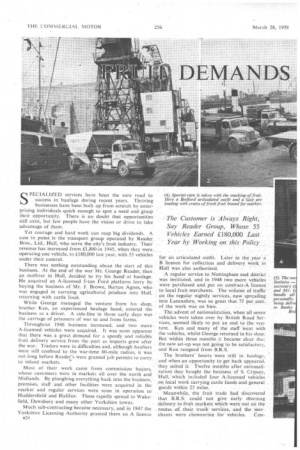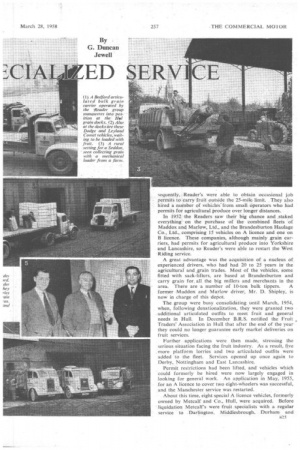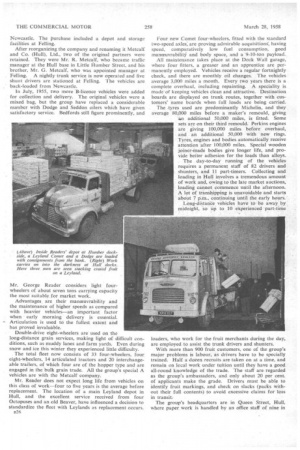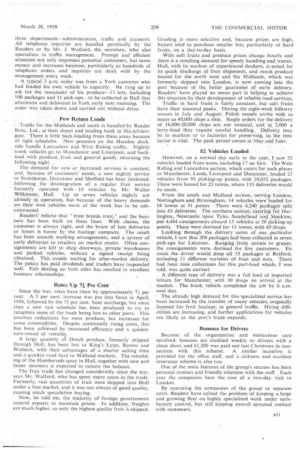DE ANDS EVIA ZED SERV
Page 58

Page 59

Page 60

Page 65

If you've noticed an error in this article please click here to report it so we can fix it.
PECIALIZED services have been the sure road to success in haulage during recent years. Thriving businesses have been built up from scratch by enterprising individuals quick enough to spot a need and grasp their opportunity. There is no doubt that opportunities still exist, but few people have the vision or drive to take advantage of them.
Yet courage and hard work can reap big dividends. A case in point is the transport group operated by Reader Bros., Ltd., Hull, who serve the city's fruit industry. Their' revenue has increased from £1,800 in 1945, when they were operating one vehicle, to 1,180,000 last year, with 55 vehicles under their control.
There was nothing outstanding about the start of this business. At the end of the war Mr. George Reader, then an outfitter in Hull, decided to try his hand at haulage. He acquired an A-licensed 5-ton Ford platform lorry by. buying the business of Mr. J. Brown, Burton Agnes, who was engaged in carrying agricultural produce into Hull, returning with cattle food.
While George managed the venture from his shop, brother Ken, an experienced haulage hand, entered the business as a driver. A side-line in those early days was the carriage of prisoners of war to and from farms.
Throughout 1946 business increased, and two more • A-licensed vehicles were acquired. It was soon apparent that there was a great demand for a speedy and reliable fruit delivery service from the port as imports grew after the war. Traders were in difficulties and, although hauliers were still confined to the war-time 60-mile radius, it was not long before Reader's were granted job permits to carry to inland markets.
Most of their work came from commission buyers, whose customers were in markets all over the north and Midlands. By ploughing everything back into the business, premises, staff and other facilities were acquired in the market and regular services were soon in operation to Huddersfield and Halifax. These rapidly spread to Wakefield, Dewsbury and many other Yorkshire towns.
Much sub-contracting became necessary, and in 1947 the Yorkshire Licensing Authority granted them an A licence a74
The advent of nationalization, when' all seven vehicles were taken over by British Road Services, seemed likely to put. an end to the venture. Ken and many of the staff. Went with the vehicles, whilst George returned to his shop. But -within three months it became clear that the new set-up _was not going to be Satisfactory. and Ken resigned from B.R.S.
The brothers' hearts 'Were still in haulage, and When an opportunity to get back appeared, they seized it. Twelve months after nationalization they bought the business of S. Cripsey, 'Hull,' which included four A-licensed vehicles on local wcirk Carrying Cattle foods and general. goods Within -25 miles.
Meanwhile, the fruit trade had !discovered that B.R.S. could :not 'give early Morning delivery to fruit market which were-not on the routes ,of their trunk-services, and the mer
chants were clarnourine for vehicles. Con sequently, Reader's were able to obtain occasional job permits to carry frtiit outside the 25-mile limit. They also hired a number of vehicles from small operators who had permits for agricultural Produce over longer distances.
In 1952 the Readers saw their big chance and _staked everything on the purchase of the combined fleets of Maddox and Marlow, Ltd., and the Brandesburton Haulage Co., Ltd., comprising 15 vehicles on A licence and one on B licence. These companies, although mainly grain carriers, had permits for agricultural produce into Yorkshire and Lancashire, so Reader's were able to restart the West Riding service.
A great advantage was the acquisition of a nucleus of experienced drivers, who had had 20 to 25 years in the agricultural and .grain trades. Most of the vehicles, some fitted with sack-lifters, are based at Brandesburton and carry grain for all the big millers and merchants in the area. There are a number of 10-ton bulk tippets. A former Maddox and Marlow driver, Mr. D. Shipley, is now in charge of this .depot.
The group were busy consolidating until March, 1954, when, following denationalization, they were granted two additional articulated outfits to meet fruit and general needs in Hull. In December B.R.S. notified the Fruit Traders' Association in Hull that after the end of the year they could no longer guarantee early market deliveries on fruit services.
Further applications were then made, stressing the serious situation facing the fruit industry. As a result, five . more platform lorries and two articulated outfits were added to the fleet. Services opened up once .again to Derby, Nottingham and East Lancashire.
Permit restrictions had been lifted, and vehicles which could formerly be hired were now largely engaged in looking for general work. An application in May, 1955, for an A licence to cover two eight-wheelers was successful, and the Manchester service was restarted.
About this time, eight special A licence vehicles, formerly owned by Metcalf and Co., Hull, were acquired. Before liquidation Metcalf's were fruit specialists with a regular service to Darlington, Middlesbrough. Durham and
Newcastle. The purchase included a depot and storage facilities at Felling.
After reorganizing the company and renaming it Metcalf and Co. (Hull), Ltd., two of the original partners were retained. They were Mr. R. Metcalf, who became traffic manager at the Hull base in Little Flurnber Street, and his brother, Mr. G. Metcalf, who was appointed manager at Felling. A nightly trunk service is now operated and five shunt drivers are stationed at Felling. The vehicles are back-loaded from Newcastle.
In July, 1955, two more 'B-licence vehicles were added for collection and delivery. The original .vehicles were a mixed bag, but the group have replaced a considerable number with Dodge and Seddon oilers which have given satisfactory service. fledfords still figure prominently, and Mr. George Reader considers light four wheelers of about seven tons carrying capacity the most suitable for market work.
Advantages. are their maneeuvrability and the maintenance of higher speeds as compared with heavier vehicles—an important factor
when early morning delivery is essential.
Articulation is used to the fullest extent and has proved invaluable.
Double-drive eight-wheelers are used on the long-distance grain services, making light of difficult conditions, such as muddy lanes and farm yards. Even during snow and ice this winter they experienced little difficulty.
The total fleet now consists of 33 four-wheelers, four eight-wheelers, 14 articulated tractors and 20 interchange able trailers, of which four are of the hopper type and are engaged in the bulk grain trade. All the group's special A vehicles are with the Metcalf company.
Mr. Reader does not expect long life from vehicles on this class of work—four to five years is the average before replacement. The location of a main Leyland depot in Hull, and the excellent service received from four Octopuses and an old Beaver, have influenced a decision to
standardize the fleet with Leylands as replacement occurs. n26
Four new Comet four-wheelers, fitted with the standard two-speed axles, are proving admirable acquisitions, having speed, comparatively low fuel consumption, good manceuvrabilitY and body space, and a 9-10-ton payload.
All maintenance takes place at the Dock Wall garage, where four fitters, a greaser and an apprentice are permanently employed. Vehicles receive a regular fortnightly check, and there are monthly oil changes. The vehicles average 3,000 miles a month. Every two years there is a complete overhaul, including repainting. A speciality is made•of keeping vehicles clean and attractive. Destination boards are displayed on trunk routes, together with customers' name boards when full loads are being carried.
The tyres used are predominantly Michelin, and they average 80,000 miles before a maker's remould, giving an additional 50,000 miles, is fitted. Some sets are on their third remould. Perkins engines are giving 100,000 miles before overhaul, and an additional 50,000 with new rings. Tyres, engines and bodies automatically receive attention after 100,000 miles. Special wooden joiner-made bodies give longer life, and provide better adhesion for the loads than alloys.
The day-to-day running of the vehicles requires a permanent staff of 82 drivers and shunters, and 11 part-timers. Collecting and loading in Hull involves a tremendous amount of work and, owing to the late market auctions, loading cannot commence until the afternoon. A lot of transhipping is unavoidable and starts about 7 p.m., continuing until the early hours.
Long-distance vehicles have to be away by midnight, so up to 10 experienced part-time loaders, who work for the fruit merchants during the day, are employed to assist the trunk drivers and shunters.
With more than 900 fruit customers, one of the group's major problems is labour, as drivers have to be specially trained. Half a dozen recruits are taken on at a time, and remain on local work under tuition until they have a good all-round knowledge of the trade. The staff are regarded as the group's ambassadors, and only about 20 per cent. of applicant§ make the grade. Drivers must be able to identify fruit markings, and check on slacks (packs without their full contents) to avoid excessive claims for loss in transit.
The group's headquarters are in Queen Street, Hull, where paper work is handled by an office staff of nine in
three departments—administration, traffic and accounts. All telephone inquiries are handled personally by the Readers or by Mr. J. Walford, the secretary, who also specializes in traffic management. Prompt and efficient attention not only impresses potential customers, but saves money and increases business; particularly as hundreds of telephone orders and inquiries are dealt with by the management _every week.
A typical 3 p.m. order was from a York customer who had loaded his own vehicle to capacity. He rang up to ask for the remainder of -his produce-13 lots, including 100 packages and 11 pick-bps—to be collected in Hull that afternoon and delivered in York early next morning. The order was taken down and carried out without delay.
Fevv Return Loads
Traffic for the Midlands and south is handled by Reader Bros., Ltd., at their depot and loading bank in Blackfriarsgate. 'There is little back-loading from these areas because of tight schedules. New premises on the Humber dockside handle Lancashire and %Vest Riding traffic. Nightly trunk vehicles go to Manchester and Liverpool, and backload with produce, fruit and general goods, returning the following night. • The demand for new or increased services is constant, and, 'because of customers' needs, a new nightly service to Scunthorpe, Doncaster and Sheffield has been instituted, following ,the disintegration of a regular .fruit service formerly operated with 10 vehicles by Mr. Walter ,Wilkinson, Hull. Up to seven vehicles nightly are already in operation, but because of the heavy demands on their own vehicles most of the work has to be subcontracted.
Readers' believe that "trust breeds trust," and the business has been built on these lines. With claims, the customer is always right, and the brunt of late deliveries or losses is borne by the haulage company. The result has been smooth working arrangements, and a system of early deliveries to retailers on market routes. Often consignments are left in shop doorways, private warehouses and parked vehicles, without a signed receipt being obtained. This avoids waiting for after-market delivery. The policy has paid dividends and traders have responded well. Fair dealing on both sides has resulted in excellent business relationships.
• Rates Up 74 Per Cent
• Since the war, rates have risen by approximately 74 per cent. A 5 per cent, increase was put into force in April, 1956, followed by the 74 per cent. Suez surcharge, but since then a new rate schedule has been produced to try to recapture some of the trade being lost to other ports. This involves reductions for most produce, but increases for some commodities. Despite continually rising costs, this has been achieved by increased efficiency and a quicker turn-round of vehicles.
A large quantity of Dutch produce, formerly shipped through Hull, has been lost to King's Lynn, Boston and Wisbech, with their advantages of a shorter sailing time and a quicker road haul to Midland markets. The rebuilding of the Humberside quay in Hull, together with new and faster steamers is expected to restore the balance.
The fruit trade has changed considerably since the war, says Mr. Walford, who has spent many years in the trade. Formerly, vast quantities of fruit were shipped into Hull under a free market, and it was not always of good quality, causing much speculative buying.
Now, he told me, the majority of foreign governments control exports to maintain prices. In addition, freights are much higher, so only the highest quality fruit is shipped. Grading is more selective and, because prices are high, buyers tend to purchase smaller lots, particularly of hard fruits, on a day-to-day basis.
. With soft fruits and produce prices change hourly and there is a resulting demand for speedy handling and transit. Hull, with its nucleus of experienced dockers, is noted for Its quick discharge Of fruit shipments, and much produce bound for the north west and the Midlands, which was formerly shipped into London, is now coming into the port because of the better guarantee ofearly delivery. Readers' have played no mean part in helping to achieve this situation by their development of reliable road services.
Traffic in hard fruits is fairly constant, but soft fruits have their seasonal peaks. During the eight-week bilberry season in July and August, Polish vessels arrive. With as many as 40,000 chips a ship. Single orders for the delivery of 16,000-20,000 chips are not unusual, and at. 2,000 a lorry-load they require careful handling. Delivery 'may be to markets or to factories for preserving, so the time factor is vital. The peak period comes in May and June.
52 Vehicles Loaded
However, on a normal day early in the year, I saw 52 vehicles loaded from noon, including 17 on hire. The West Riding and Lancashire section, which caters for such places as Manchester, Leeds, Liverpool and Doncaster, loaded 23 vehicles from 93 picking-up points, with 10,032 packages. These were bound for 23 towns, where 133 deliveries would be made. .
From the south and Midland section, -serving London, Nottingham and Birmingham, 14 vehicles''wereloaded for 19 towns at 31 points. There were -4,24' packages' split into 63 deliveries, The northern section,' catering for Darlington, Newcastle upon Tyne, Sunderland -and Stockton, put 4,444 consignments aboard 15 vehicles at 56 picking-up points. These were destined for 13 towns, with 45 drops.
Looking through the ,delivery notes of one particular vehicle, I saw that 209 packages had been collected in seven pick-ups for Leicester. Ranging from oniOns to grapes, the consignments were destined for five customers. En route the driver would drop off 53 packages at Retford, including 11 different varieties of fruit and nuts. There had been nine collections-forthis part-load which, I was told, was quite normal.
A different type of delivery was a full load of imported lettuce for Manchester, with 30 drops on arrival at the market. The trunk vehicle completed the job by 6 a.m. next day.
• The already high demand for this specialized service has been increased by the transfer of many vehicles, originally licensed for fruit haulage, to general traffic. Hiring difficulties are increasing, and further applications for vehicles are likely as the port's trade expands.
Bonuses for Drivers
Because of the organization and meticulous care involved, bonuses are credited weekly to drivers with a clean sheet, and £1200 was paid out last Christmas in connection with this scheme. A similar incentive is provided for the office staff, and a sickness and accident insurance scheme is also run.
One of the main features of the group's success has been personal contact and friendly relations with the staff. Each year the companies bear the cost of a two-day visit to London.
By operating the companies of the group as separate units, Readers have solved the problem of keeping a large and growing fleet on highly specialized work under satisfactory control, but still keeping overall personal contact with customers.




















































































































